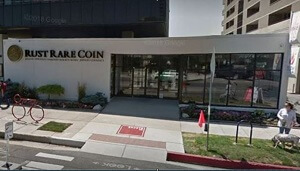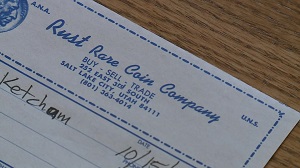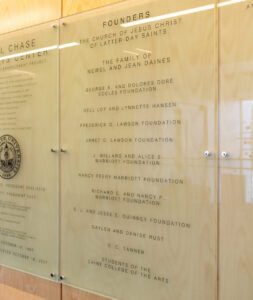 Yet another Ponzi, this time with silver trading.
Yet another Ponzi, this time with silver trading.
Gaylen Rust, from the Rust Rare Coin company, may spend the next 19 years in prison for a $200m Ponzi fraud spanning two decades.
The Ponzi
The Rust Rare Coin trading business started with Gaylen’s father in 1966. The shop had been selling rare coins, collectible money and precious metal bullions, until his son Gaylen D Rust took over the business and started raising money over his innovative trading strategy.
 Gaylen Rust’s “silver trading program” was using an HSBC trading algorithm to trade physical silver, using only half of investors’ assets. The system allowed him to sell at the beginning of downward movements and allowed him to buyback at the bottom. The profits were then used to buy more physical silver and deposit for safekeeping at the Brinks. The strategy apparently never saw a bad month. The worst year was up 12%, while making 20-25% per year usually. He sometimes made up to 40% per year. Rust would not charge management fees, only performance fees. He offered 2 weeks liquidity.
Gaylen Rust’s “silver trading program” was using an HSBC trading algorithm to trade physical silver, using only half of investors’ assets. The system allowed him to sell at the beginning of downward movements and allowed him to buyback at the bottom. The profits were then used to buy more physical silver and deposit for safekeeping at the Brinks. The strategy apparently never saw a bad month. The worst year was up 12%, while making 20-25% per year usually. He sometimes made up to 40% per year. Rust would not charge management fees, only performance fees. He offered 2 weeks liquidity.
Besides the high performance, investors should have been warry about
- the lack of any offering material to investors,
- the lack of account statements, only excels with monthly profits and assets stored.
 At the time the SEC filed its case in November 2018, Rust had raised $85.7 million in 2017 until mid-2018 from 300 investors for this investment program. He was supposed to hold $80 m at the Brinks in physical assets.
At the time the SEC filed its case in November 2018, Rust had raised $85.7 million in 2017 until mid-2018 from 300 investors for this investment program. He was supposed to hold $80 m at the Brinks in physical assets.
But instead of trading and generating the high returns, Mr. Rust
- returned $70 millions to departing investors,
- withdrew $2.7 m in cash,
- used $1.1m for horse racing, as well as a mansion,
- used $11m to buy and operate a music production business,
- leaving only 1% of the raised money in the bank account.
- There never was any silver stored at the Brinks, and he barely ever traded anything. He didn’t even have an account at HSBC.

But he made generous and publicized contributions to the Utah University, the Church of Jesus Christ of Later Day Saints and several musical societies.
The outcome for the fraudsters
In total, Gaylen pleaded guilty to raising $200m from 500 investors, staring from 1996. He admitted to securities fraud, wire fraud and money laundering. He agreed to return $153m to his victims, but they are unlikely to ever see that money. The prosecutors asked for 19 years in prison. he is awaiting sentencing.
 Gaylen’s wife, Denise, the secretary of Rust Rare Coin, admitted that she was aware of the 20-year fraud. She was sentenced to 18 months in prison for… transferring $12,000 from an investor account to her daughter. She has already served her prison sentence and has been released into her 5-year probation. Interestingly enough, as the firm’s secretary, she wrote all the checks, notably those to her husband’s lover. Mr. and Ms. Rust are now divorced.
Gaylen’s wife, Denise, the secretary of Rust Rare Coin, admitted that she was aware of the 20-year fraud. She was sentenced to 18 months in prison for… transferring $12,000 from an investor account to her daughter. She has already served her prison sentence and has been released into her 5-year probation. Interestingly enough, as the firm’s secretary, she wrote all the checks, notably those to her husband’s lover. Mr. and Ms. Rust are now divorced.
The couple’s son, Joshua Rust, pleaded not guilty and is awaiting trial.
Zions Bank, the bank handling the firm’s money, is being sued for knowing and not acting.
The outcome for others
Wayne Klein, the receiver, is now liquidating assets. The mansion is gone. Some coins were sold at an auction.
 Chance Thomas, whose started up HUGEsound 20 years before it was bought by Rust, has seen his company crumble. He lost the music copyrights, the distribution deals and the soundtrack agreements in the receivership and restarted from zero – borrowing musical equipment. A two-year lawsuit allowed him to regain some of the soundtracks to start his new venture.
Chance Thomas, whose started up HUGEsound 20 years before it was bought by Rust, has seen his company crumble. He lost the music copyrights, the distribution deals and the soundtrack agreements in the receivership and restarted from zero – borrowing musical equipment. A two-year lawsuit allowed him to regain some of the soundtracks to start his new venture.
 The recipients of the charity donations are asked to return the gifts received over the last decade.
The recipients of the charity donations are asked to return the gifts received over the last decade.
- The Utah State University has refused to pay the $544,000 donation, indicating that the monies have been used already. It is now being sued. The students are scared that the university will not be able to keep on funding their education.
- Rust progressively tithed $2.4 million to the Church of Jesus Christ of Later Day Saints. The Mormon church stated that it did not know at the time that the donations were the results of ill-gotten gains, and has agreed to return the money.
As usual in Ponzi’s, there are many broken dreams and many difficult retirements.
The 500+ investors are expecting to regain only 20-40% of their investments.
References:
- SEC vs Gaylen Rust and Rust Rare Coin, November 15, 2018: claim
- Commercial Litigation Texas, December 4, 2018: Rust Rare Coin Silver Scam
- KSL TV, May 9, 2019: West Valley City Woman Says She Lost $250K In Ponzi Scheme; 3 Face Federal Indictment
- Deseret News, July 2, 2020: Rust Rare Coin family member admits to money laundering in alleged $200M silver trading scam
- Deseret News, March 2, 2021: He fell victim to a Ponzi scheme. But now this Utah composer has made a ‘huge’ comeback
- The Utah Statesman, July 28, 2021, USU sued after receiving almost a decade of fraud donations
- Fox 13, December 20, 2021: Gaylen Rust, Utahn accused of $200 million Ponzi scheme, pleads guilty


